unit 9 Can you come to my party 全单元五课时课件
- 格式:ppt
- 大小:15.46 MB
- 文档页数:80

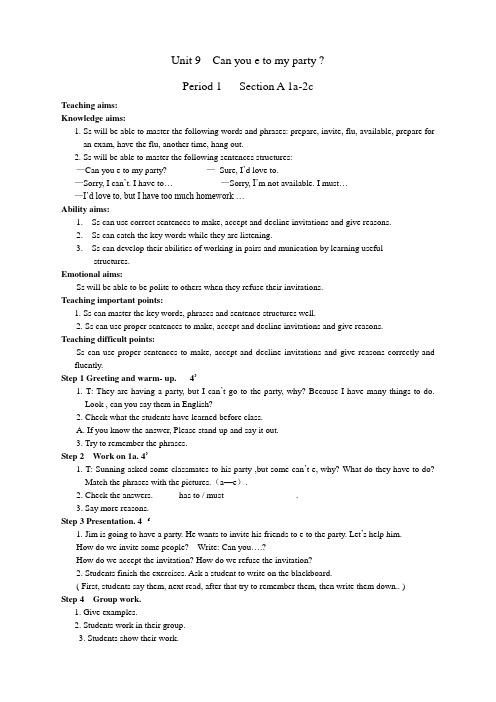
Unit 9 Can you e to my party ?Period 1 Section A 1a-2cTeaching aims:Knowledge aims:1. Ss will be able to master the following words and phrases: prepare, invite, flu, available, prepare foran exam, have the flu, another time, hang out.2. Ss will be able to master the following sentences structures:—Can you e to my party? —Sure, I’d love to.—Sorry, I can’t. I have to…—Sorry, I’m not available. I must…—I’d love to, but I have too much homework…Ability aims:1. Ss can use correct sentences to make, accept and decline invitations and give reasons.2. Ss can catch the key words while they are listening.3. Ss can develop their abilities of working in pairs and munication by learning usefulstructures.Emotional aims:Ss will be able to be polite to others when they refuse their invitations.Teaching important points:1. Ss can master the key words, phrases and sentence structures well.2. Ss can use proper sentences to make, accept and decline invitations and give reasons.Teaching difficult points:Ss can use proper sentences to make, accept and decline invitations and give reasons correctly and fluently.Step 1 Greeting and warm- up. 4’1. T: They are having a party, but I can’t go to the party, why? Because I have many things to do.Look , can you say them in English?2. Check what the students have learned before class.A. If you know the answer, Please stand up and say it out.3. Try to remember the phrases.Step 2 Work on 1a. 4’1. T: Sunning asked some classmates to his party ,but some can’t e, why? What do they have to do?Match the phrases with the pictures.(a—e).2. Check the answers. _____ has to / must ________________.3. Say more reasons.Step 3 Presentation. 4‘1. Jim is going to have a party. He wants to invite his friends to e to the party. Let’s help him.How do we invite some people? Write: Can you….?How do we accept the invitation? How do we refuse the invitation?2. Students finish the exercises. Ask a student to write on the blackboard.( First, students say them, next read, after that try to remember them, then write them down.. )Step 4 Group work.1. Give examples.2. Students work in their group.3. Students show their work.Step 5: Listening 1b.1. T: My friend Sun Ning can’t go to the movies with me. Because he has a party. And he is invitinghis friends (Tim, Kay, Anna and Wilson) to his party.2. Listen and write the names.Step 6: Listening 2a and 2b.1. T: Can Anna go to the party? Look at the pictures. What is she doing? She is inviting herfriends. Can all her friends e ?2. Listen and circle.3. Listen and write down the reasons.4. Listen and imitate.Step 7 Group work (2c)1. T: Let’s invite your partner to do something.2. Read the example.3. Students work in their group.4. Students show their work.Step 8 Summarize and do some exercises.Unit19 Can you e to my party ?Section A 1a---2cfCan you …?—Sure, I’d love to.—I’d love to, but I have too much homework…—I’m afraid I can’t…I have to …—I’m sorry I can’t. I’m going …—I’m sorry, I’m not available.Unit 9 Can you e to my party ?Period 2 Section A 2d-3cTeaching aims:Knowledge aims:1.Ss will be able to master the following words and phrases: sad, until, catch, invite, invitation, accept,refuse, turn down, not…until2.Ss will be able to master the following sentences structures:--Can you e to my party? --I’d love to, but I might have to…--Can he/she e to my party?-- Sure, he/she’d love to.--Sorry, he/she can’t. He/She has to…--Sorry, he/she is not available. He/She must…--Sorry, he/she can’t. He/She might have to…--Can they go to the movies? –No, they’re not free. They might have to …Ability aims:1. Ss can use correct sentences to make, accept and decline invitations and give reasons.2. Ss can develop their abilities of working in pairs and munication by learning usefulstructures.Emotional aims:Ss will be able to be polite to others when they turn down their invitations.Teaching important points:1. Ss can master the key words, phrases and sentence structures well.2. Ss can use might have to or might +do to give reasons when they turn down others.Teaching difficult points:Ss can use proper sentences to make, accept and decline invitations and give reasons correctly and fluently.Teaching procedures:Step 1: Warming-up and revisionT:I want to invite my friends to my party. Do they accept or turn down my invitation?But they can’t e to my party. Look at the pictures, these their reasons. Can you say them quickly?Step 2 Work on 2d.1. Show a picture of my friend Nick T: Can Nick e to the party?2. Read 2d and answer:1). Can Nick e to my party?2). Is he free on Saturday?3). When will Jeff and Nick meet?(How do you know that? Ss: Catch you on Monday.)3. Listen and fill in the blanks.4. Get ss to act the conversation, and help the students in needStep 3 Work on 3a1. T: Nick can’t e to my party because he isn’t free until next Monday. What about my another friendTim? Here are his activities this week. What is he going to do on Saturday?Help students answer: I’m not sure, he might …2. T: Here are some conversations between Nick and me, can you help him plete them?3. Tell Ss to read the conversation in 3a and try to plete the answers with might and one of thephrases in the box.Step 4 Work on 3b:1.T: Tim isn’t available on Saturday, he turn down my invitation too .What about his otherinvitations?Does he accept or refuse them?plete the sentence below.2. Practice in pairs.Step 5 Group work1. According to Cindy’s timetable, get students to write their own timetable next week. Choose a dayand time to have a party. Then one invites his classmates to the party and report whether they accept the invitation or not.2. Ask and answer3. Make a reportStep 6 summarize .1. Read grammar focus.2. Explain grammar focus .Step 7 Homework.Unit9 Can you e tomy party ?Section A 2d ---3cCan you play tennis with us?S ure. I’d love to.Sorry, I can’t. I have to look after my sister at home.…Would you like to go to the movies?I’m afraid I can’t. I might have to prepare for the math exam.Unit 9 Can you e to my party?Period 3 Section B 1a-1fTeaching aims:Knowledge aims:1.Ss will be able to master the following words and phrases: calendar, weekday, reply, glad, the dayafter tomorrow, the day before yesterday, be glad to, in the daytime.2.Ss will be able to master the following sentences structures:--What’s today? --It’s Tuesday the 10th.-- What’s tomorrow? --It’s Wednesday the 11th.--What was yesterday? --It was Monday the 9th.3. Ss will be able to talk about the plans on the calendar.Ability aims:1.Ss can use correct sentence structures to talk about date, make, accept and decline invitations andgive reasons.2.Ss can improve their listening abilities by catching some key words.3.Ss can develop their abilities of working in pairs and munication by learning useful structures. Emotional aims:Ss will be able to be polite to others when they turn down their invitations.Teaching important points:1.Ss can master the key words, phrases and sentence structures well.Ss can talk about the plans on the calendar.Teaching difficult points:Ss can use proper sentences to make, accept and decline invitations and give reasons correctly and fluently.Teaching procedures:Step 1: Warming-up and lead-in1.Enjoy a song and ask Ss : How many days are there in a week? What are they?2.Revise seven days of the week and present weekdays3.review the dates one by one.Step 2: Presentation1. T: There are seven days in a weeks. Today is Tuesday.Look, it’s a calendar of this month. What’s the date today?What’s today?2.Present--What’s the day after tomorrow? --It’s ...--What was the day before yesterday? --It was ...Step 3 Work on 1a and 1b.1. Write the dates in the calendar, and check the answers.2. Write the words in 1b below the correct dates on the calendar in 1aStep 4 Pair work.T: What’s today? It’s …What is tomorrow? It’s …What’s the day after tomorrow? It’s …What was yesterday? It was…Step5: Work on 1d and 1e.Different people like to invite their friends to do different things. Andy would like to invite Vince to play tennis with him?What’s Vince’s reply?Can you predict?Listen and circle.Listen and match .Role- play the conversation.Step 6 Pair work1. T: On Tuesday, Vince has to…On Wednesday, he …,… He’s really busy these days. Look atanother two students’ calendars. Student A looks at Tina’s calendar on p72. Student B looks at Lily’s calendar on p81. Make a dialogue and find a time when you can both go shopping.2. Get Ss to do pair workStep7 Homework.Unit9 Can you e to my party ?Section B 1a---1fWhat’s today? It’s …What is tomorrow? It’s …What’s the day after tomorrow? It’s …What was yesterday? It was…Unit 9 Can you e to my party?Period 4 Section B 2a-2cTeaching aims:Knowledge aims:1.Ss will be able to master the following words and phrases: forward, look forward tosth/doing sth.,delete, print, goodbye, take a trip, preparation, glue, without, surprised, hear from, housewarming, be glad to…2. Ss will be able to master the following sentences structures:This party is the best way to say “Thank you and goodbye”.I already have a great idea about how to do that.Let me know if you need my help.Bring Ms. Steen to the party without telling her so that she can be surprised.I look forward to hearing from you all.3. Ss will be able to learn some reading strategies.Ability aims:1. Ss can use reading strategies to prehend the passage.2. Ss can learn to write an invitation and accept or turn down it.Emotional aims:1. Ss will be able to be polite to others when they turn down their invitations.2. Ss will be able to form the habit of holding parties for various purpose and enjoy the life. Teaching important points:Ss can master the key words, phrases and sentence structures well.Ss can Ss can use reading strategies to prehend the passage.Teaching difficult points:Ss can use proper sentences to make, accept and turn down the invitations and give reasonscorrectly and fluently.Teaching procedures:Step 1: Warming-up and lead-in.1. Enjoy a short video and ask Ss : Does Mickey know the party?2. Present: Mickey is surprised. His friends prepare the party without telling him.T: What else is he surprised?3. Work on 2a.Present some new knowledge according to the pictures.T: What kind of party is it? Make a list of other kinds of parties and share what they think ofthem.Step 2: Before reading.1. T: What does David think of these parties? Here is a passage from him.2. Reading Strategy 1:Predict the picturePresent some new words.T: It’s an e-mail from David, does anyone reply it? How many messages are there in it?What’s each message about?Step 3 While reading:1. Read quickly and match the reason with each message.A Reading Strategy 2:Read for meaning, not for detail.2. T: Can you guess any words of the messages?B Reading Strategy 3: Guess the meaning of a new word from the context.Give some examples and help ss find some key words.C Reading Strategy 4: Scan the message quickly to find details without reading the wholemessage.3. Read Message 3 and fill in the blanks.4. Read Message 1 and judge T or F.5. Read Message 2 and answer questions.Step 4 Work on 2c .Scan(扫描)the messages again and answer the questions.Step 5 After reading . (Writing)1. MS.Steen走了,Mr.Lee 来代替她教David 班的英语。
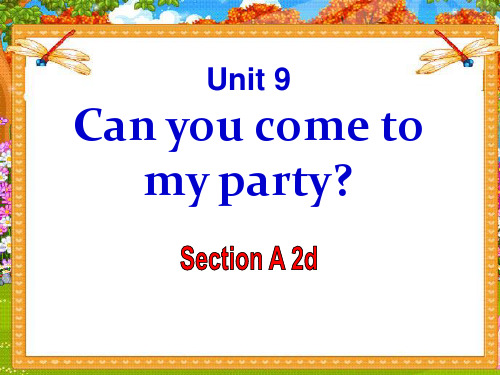
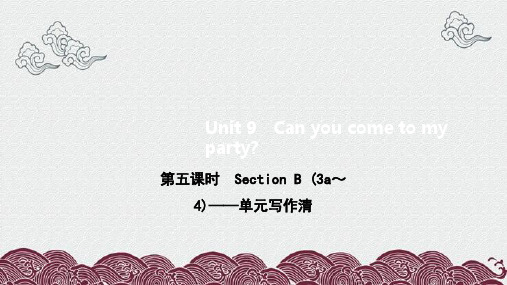
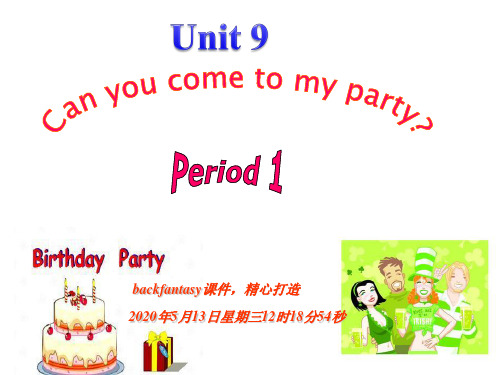
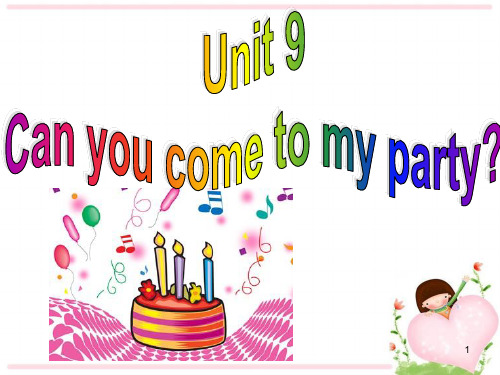
Unit9 SectionB〔3a-Self Check〕名师教案【教材版本与册数】新目标人教版八年级上册【单元名称】Unit 9 Can you come to my party?【课时】Section B 3a-Self Check〔第5课时〕【课型】Writing〔写作课〕附:教学活动设计ExerciseI. 选词填空1. My American friend is going to ______ me next vacation.2. Are you _______ football this weekend?3. I can’t join you because I _______ help my mom on weekdays.4. Please keep quiet! I’m trying to ______.5. Do you want to _______ to my birthday party?Ⅱ.单项选择1. Before 2021 we will finish_____ the Olympic Park.A. buildB. builtC. buildingD. to build2. I'm sorry to have kept you _____ for almost two hours.A. waitB. to waitC. waitingD. waits3. ---Bob speaks Chinese quite, well.---Yes, so he does. He practices _____ Chinese every dayA. speakingB. speakC. speaksD. spoke4. -May I use your dictionary?- _____A. Never mindB. You are welcomeC. It doesn't matterD. Certainly. Here you are5. Jack is very funny. He always makes us_____A. laughB. laughingC. to laughD. laughs6. My mother is busy_____ the room.A. cleanB. to cleanC. cleaningD. cleans7. Sorry, I'm busy today. I have_____ homework to do.A. much tooB. too muchC. too manyD. many too8. Can you play football______ us this afternoon?A. withB. atC. onD. around9. Thanks a lot for _____ me _____ your party.A. invite; forB. invite; toC. inviting; forD. inviting; to10. ---Would you like to come to dinner this Sunday, Xiaoming?----_____A. I'd love to, but I have lots of things to doB. Oh, no. That'll be too tiredC. I'll stay at homeD. Yes, please。